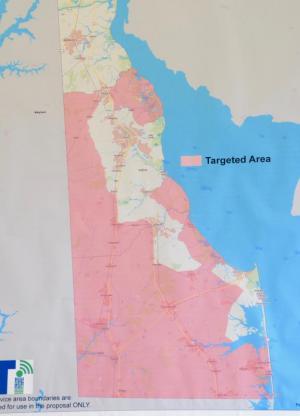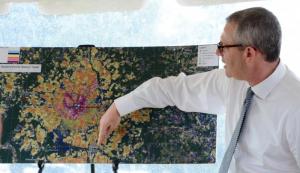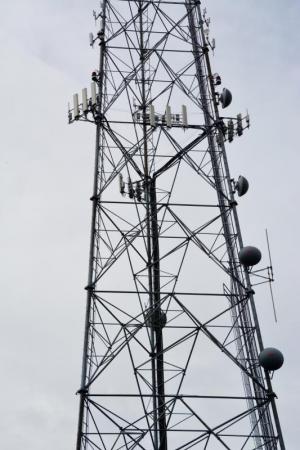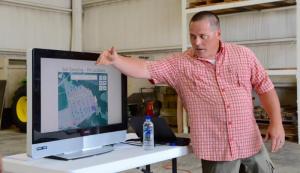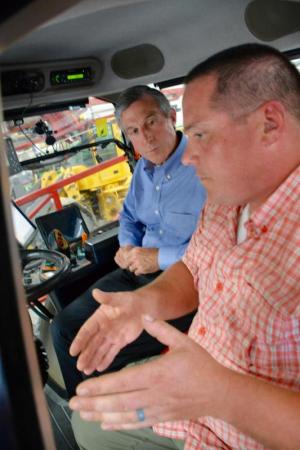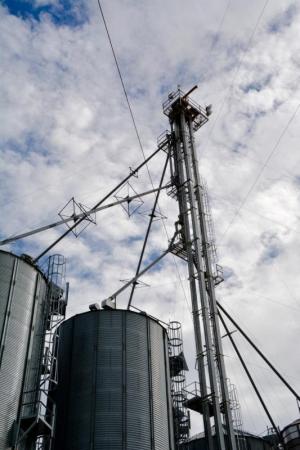Carney: Eliminate broadband deserts in southern Delaware
With the City of Seaford's communications tower in the background, Gov. John Carney announced July 24 a major step in a goal to provide broadband access to every Delaware resident within the next 24 months.
To complement ongoing efforts and pilot projects, the General Assembly dedicated $1.3 million to eliminate what the governor called broadband deserts in southern Delaware, mostly in Sussex County.
That amount will be added to $700,000 remaining in the Delaware Broadband Fund for a total of $2 million to incentivize companies to partner with the state to provide cost-efficient wireless broadband to unserved and underserved areas. Sussex County Council also approved $1.2 million to expand broadband access, including funding to offset costs for private companies to use state-owned towers.
“We can't live a full life, and we can't compete unless we have broadband,” Carney said.
Seaford participated in a pilot project with Salisbury-based Bloosurf to provide wireless service to more than 30 residents within a 10-20 mile radius of the city with limited internet access. Paul Carliner of Bloosurf said large segments of underserved residents could be reached using a network of existing towers.
Carliner said Delaware is first to have a statewide plan to bridge the digital divide with resources to back it up.
“Imagine a life that is not connected in 2018,” said James Collins, chief information officer, Delaware Department of Technology and Information. “We are laser focused on eliminating those broadband deserts across the state. Today is a real milestone.”
The state has already provided funding to install fiber-optic trunk lines from Wilmington to Georgetown and Seaford to Lewes. Collins said major companies and hospitals were among the first to tie into the line.
Over the past decade, 48 schools and most state buildings have been networked under a partnership with Verizon. “This has opened new worlds for schools and students,” said Seaford School District Superintendent David Pennington.
Collins said Delaware is always ranked high for the fastest internet speeds in the country, but this applies to most of New Castle County and areas in and adjacent to towns and cities. He said it doesn't do much good for residents in most rural areas where companies will not build infrastructure because of the high cost.
The state will release a request for proposal focused on enabling wireless broadband service to homes and businesses in rural Sussex and Kent counties. The funds will be used to incentivize wireless broadband buildout by funding a percentage of a company's start-up costs, said Christina Dirksen, strategic communications manager, Delaware Department of Technology and Information.
She said priority will be given to low-cost services for lower-income families in unserved and underserved areas.
Broadband key to modern farming
Carney also visited Willin Farms, west of Seaford, another participant in the pilot project.
No one is looking forward to expanded broadband service more than Willin Farms President R.C. Willin.
The family farm has a myriad of state-of-the art technology – including on-board computers in their farm machinery – used in each phase of the farming operation – soil sampling, tillage, spraying, planting and harvesting. They use laptops, iPads, Bluetooth, GPS, specialized farming computer programs, WiFi and the cloud for research, data collection and to provide real-time evaluations of farming operations.
They have internet access equipment mounted on top of their grain elevator and also have an 85-foot portable tower they can place anywhere on the farm.
“As we work, we can retrieve information off the cloud,” said Chad Willin.
R.C. Willin said their investment in technology is unbelievable. “Without WiFi and without broadband capability we are not doing any of this,” he said.
Yet, the farm is in one of the governor's broadband desert areas. “I had four cell phone calls dropped just yesterday,” Willin said.
Brent Willin said the goal of using technology is to maximize yield, help develop a cost-effective nutrient management plan, run the farm more efficiently and cut costs. “We are able to monitor and evaluate like never before,” he said. “We were pretty much in the dark before.”
He said technology has developed quickly over the past five years.
During his three-stop tour in Sussex County, the governor also visited Delaware Electric Cooperative in Greenwood. The company has partnered with Crown Castle International Corp., the nation's largest provider of wireless infrastructure, to install 180 miles of fiber cable to connect its 26 substations.
















